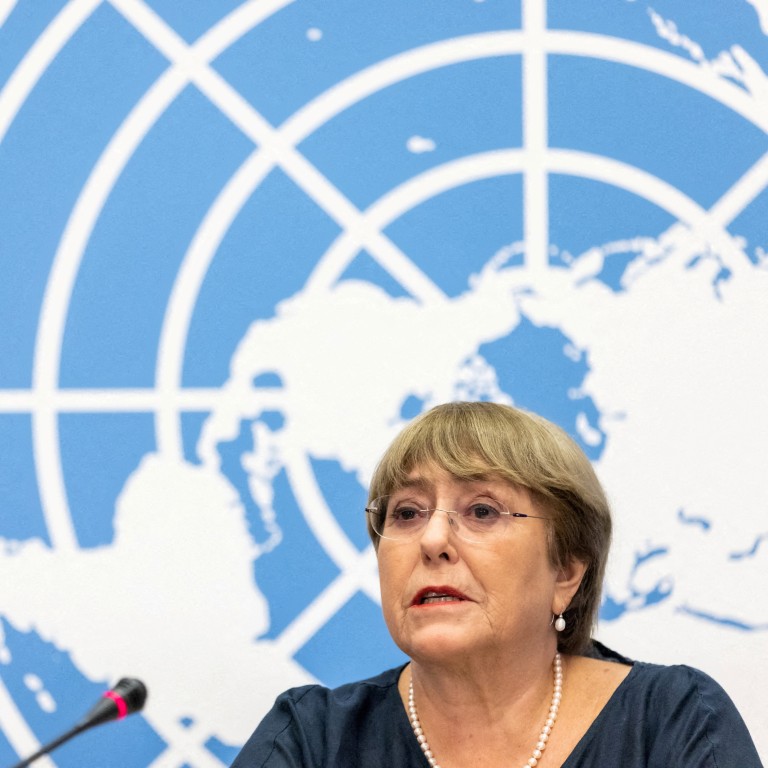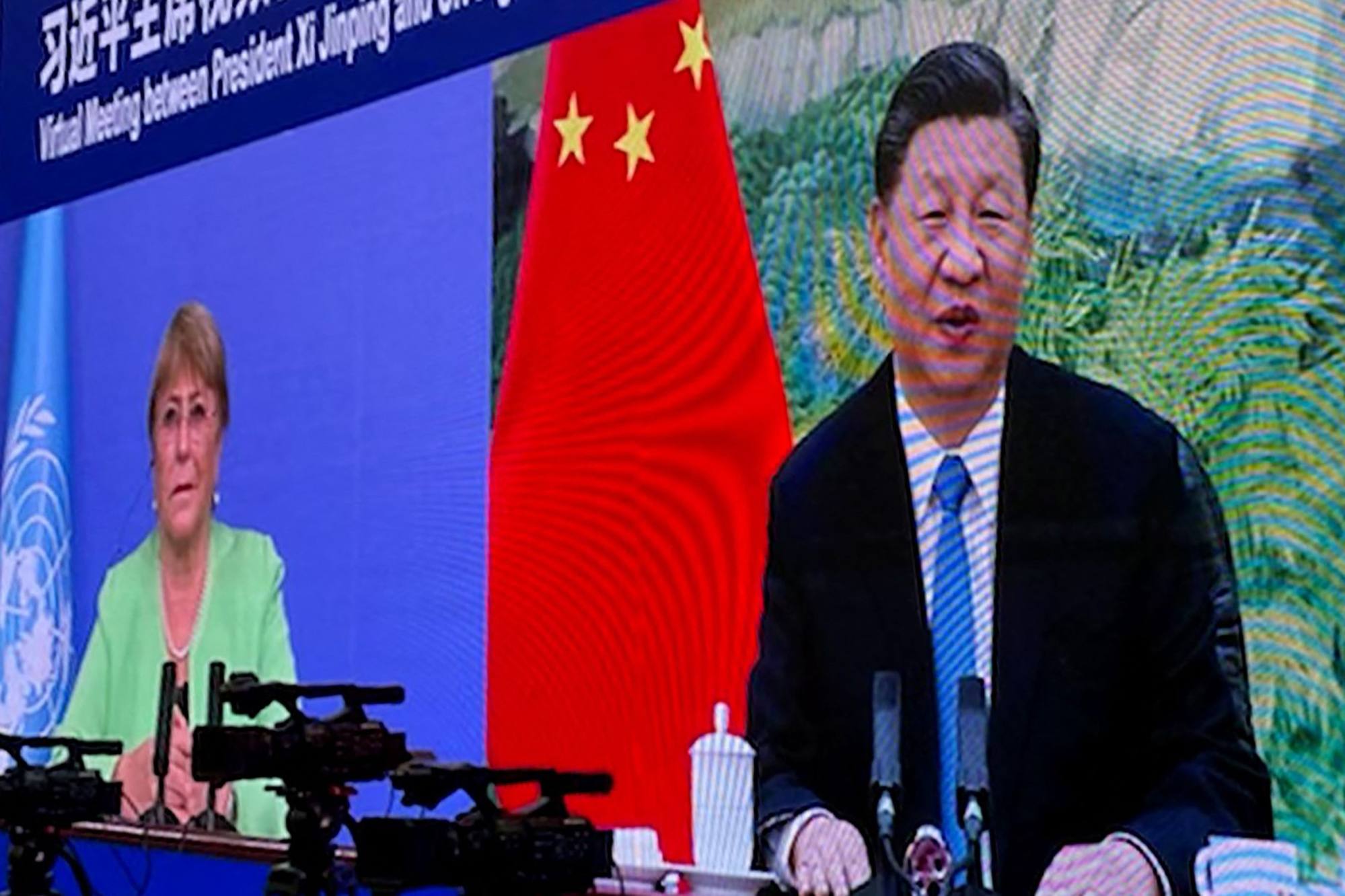
China may have committed crimes against humanity in Xinjiang, UN says
- Descriptions of detentions in region’s vocational education and training centres between 2017 and 2019 ‘marked by patterns of torture’
- After controversial delay, findings and recommendations issued minutes before Michelle Bachelet’s term as human rights chief ended
It linked Beijing’s employment policies to forced labour, found evidence of torture in detention camps that the Chinese government describes as vocational training centres, and pointed to “unusual” and “coercive” government actions that led to a starkly plunging birth rate in the Western region.
In short, the report dramatically shed light on a range of abuses that have been flagged by Uygurs and other minorities who had fled China.
It recommended “urgent action” by the Chinese government, the UN and the “international community more broadly” to address the human rights situation in Xinjiang, where Beijing is accused of operating a repressive system in which more than 1 million Uygurs and other ethnic Muslims are detained.
Addressing accusations of widespread forced labour in the region, the UN’s human rights body found indications that actions the Chinese government described as vocational training “appear to be discriminatory in nature or effect”.
These centres were “marked by patterns of torture or other forms of cruel, inhuman or degrading treatment or punishment”, the report stated.
It pointed to a “sharp decline in birth rates” in Xinjiang from 2017, with the rate dropping 48.7 per cent between 2017 and 2019. Over the same period, there was an “unusually sharp rise” in sterilisations and intrauterine device placements, UN investigators found.
The Office of the High Commissioner on Human Rights (OHCHR) interviewed 26 former detainees at government facilities, finding that two-thirds had been “subjected to treatment that would amount to torture and/or other forms of ill-treatment”.
“The extent of arbitrary and discriminatory detention of members of Uygur and other predominantly Muslim groups, pursuant to law and policy, in context of restrictions and deprivation more generally of fundamental rights enjoyed individually and collectively, may constitute international crimes, in particular crimes against humanity,” the report stated.
It cited accounts of physical and psychological torture in the facilities, including beatings with electric batons, interrogations while water was poured in the detainees’ faces, “constant hunger” that led to severe weight loss, sleep deprivation, “invasive gynaecological examinations” in group settings, and rape.
Xinjiang exports to US hit two-year high despite forced labour law
The report added that detainees were not allowed to speak their own languages or pray.
One former detainee interviewed by the investigators described singing “patriotic song after patriotic song every day, as loud as possible and until it hurts, until our faces become red and our veins appeared on our face”.
It urged third states from returning Uygurs to China at the request of the Chinese government, and recommended that international businesses implement “enhanced human rights due diligence” when operating in the region.
Along with its own assessment, the OHCHR published a lengthy rebuttal by China’s UN mission, which rejected all accusations of human rights violations in Xinjiang and said the report was based on “disinformation and lies fabricated by anti-China forces” which “undermines the credibility” of the office.

The report, titled “Fight against Terrorism and Extremism in Xinjiang: Truth and Facts” also reiterated Beijing’s long-standing position that policies on Xinjiang are for “counterterrorism”.
China repeated its assertion that the “vocational education and training centres” in Xinjiang were not “concentration camps”.
In concluding its report, Beijing called for a UN investigation into “human rights disasters caused and numerous crimes committed by the US and some other Western countries both at home and abroad”.
The report was released on the last day of Michelle Bachelet’s tenure as UN High Commissioner for Human Rights, surprising analysts, activists and officials alike.
Xinjiang ban looms large as China ships record US$33 billion textiles, garments
Bachelet, a former Chilean president and herself a political prisoner under the regime of dictator Augusto Pinochet, retired from her role after four years.
The report became a subject of intense political scrutiny, with the debate growing in volume as the delays piled up.
Last week, a year after saying the report was almost ready for publication, Bachelet said it had been shared with the Chinese government as is standard procedure.

Beijing returned it with “a big numbers of facts”, she said, which the OHCHR needed to review and decide “if appropriate to include” in the report. Bachelet also spoke of “tremendous pressure” from both sides to either publish or withhold the document, but maintained that she would not be swayed.
China critics, human rights groups, and Western governments urged the commission to release it urgently, with EU officials saying privately they hoped it would provide some irrefutably impartial evidence for the alleged abuses in Xinjiang.
Beijing, meanwhile, lobbied behind the scenes to prevent its publication. It enlisted “40 to 50” countries to sign a letter urging Bachelet to prevent its release, the former Chilean president said.
Caught in this tug of war, Bachelet spent the final days of her tenure defending herself from criticism that she was bending to the will of the Chinese government.
About 20 Hong Kong members of national legislature to visit Xinjiang
“It will be a shame, not only myself also the whole office’s work, that we could be look at only through the lens of one country when we have been dealing with hundreds of countries all this time.”
For its part, China said the “so-called assessment on Xinjiang is of grave concern to us”, in a letter sent to Bachelet, seen by the Post.
“The assessment, if published, will intensify politicisation and bloc confrontation in the area of human rights, undermine the credibility of the [office], and harm the cooperation between OHCHR and member states.”

“We strongly urge Madame High Commissioner not to publish such an assessment,” it read.
In her final address to the UN Human Rights Council on Tuesday, Bachelet bemoaned the “polarised” global political environment within which her organisation was working.
“We must do everything possible to avert a great fracture and maintain a universal system, a multipolar world with strong multilateral institutions and universal respect for international law,” she told the council.
Additional reporting by Jacob Fromer and Kinling Lo

